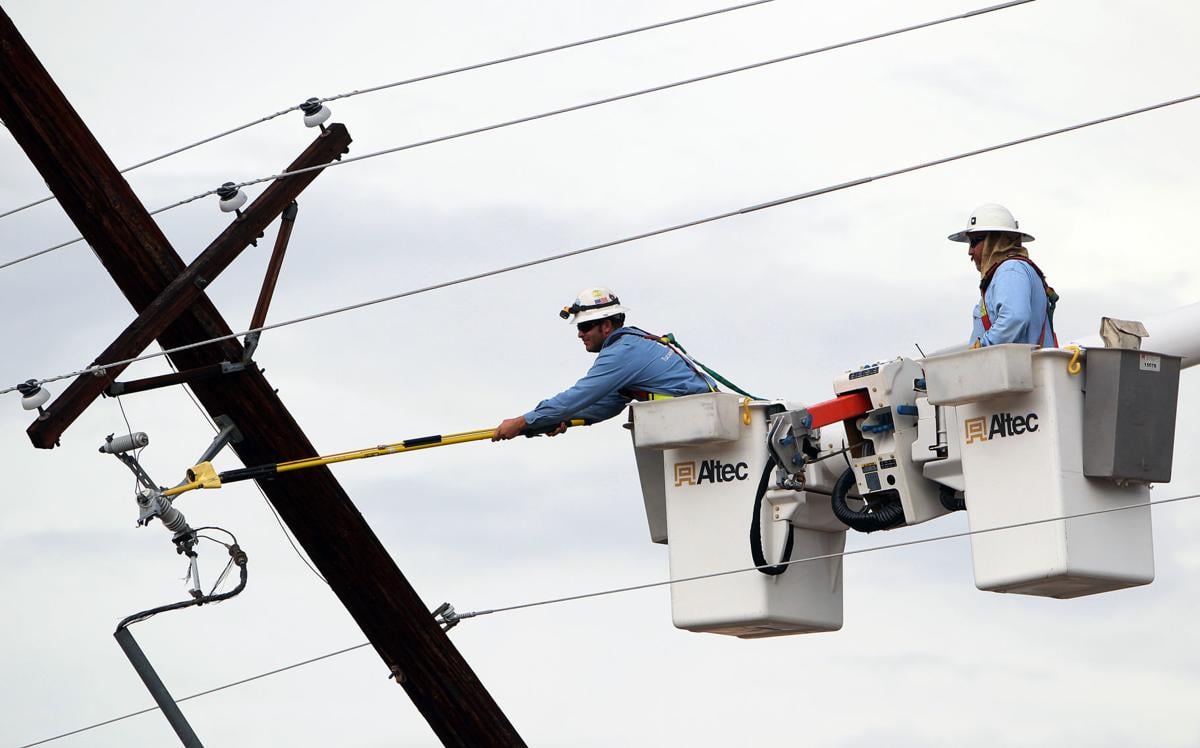Tucson Electric Power Co. says it is looking at different ways to return potentially millions of dollars in benefits to customers from the recently enacted federal tax-reform law.
But just how much TEP and its sister rural utilities, UNS Electric and UNS Gas, will return to ratepayers is unsettled, and the companies have suggested allocating part of the tax windfall to offset increasing costs.
The Arizona Corporation Commission recently prompted all state-regulated utilities to come up with plans to return to customers the savings from a cut to the top corporate tax rate, to 21 percent from 35 percent.
In a response filed with the commission, TEP and UNS said the companies are considering various short- and long-term credits to return the tax benefit to customers.
But the companies, subsidiaries of Tucson-based UNS Energy Corp., also said that because of the time that’s elapsed between rate cases, the utilities haven’t been earning their state-allowed return on their system investments.
People are also reading…
With capital investments planned for 2018 and 2019, returning all of the expected income tax savings “would put significant pressure on each company’s cash flow and serve to accelerate the timeline for future rate requests,” the utilities said.
Despite those concerns, TEP and its sister utilities “believe it is in the public interest to share a substantial portion of the expected income tax savings with their respective customers on an expedited basis,” the companies said.
TEP says its proposals may include a fast-tracked regulatory approval process to implement a billing credit as soon as possible; a higher seasonal credit that would help offset customer bills during higher usage months; or bill credits that would decline over time while still smoothing the bill impacts of future rate requests.
Another idea is to adopt “bill credits that would recognize the increasing cost of service since each company’s last test year and would not harm the companies’ financial conditions or credit ratings.”
In federal securities filings, TEP reported a federal income-tax expense of $64 million in 2016, at the 35 percent rate.
But the company deferred those taxes under a federal law that allows accelerated depreciation of certain assets, and TEP said it paid no federal income tax in 2016 and doesn’t expect to make any payments until 2020.
TEP and its related companies have not yet calculated its potential tax savings, spokesman Joe Barrios said.
But Barrios said the companies may formally propose alternatives to use some of the money to offset increasing infrastructure costs, along with direct customer credits, to forestall the need for higher overall rates.
“All of those tax savings will accrue for the benefit for customers, it’s a matter of when and how,” Barrios said.
“We fully expect some of that will show up as a bill credit, but a portion of that could pay for investments in infrastructure that is providing service to our customers right now.”
Arizona Public Service Co., the largest state-regulated utility, already has filed a proposal to pass through the tax benefit by reducing the energy charges customers pay per kilowatt-hour of power, in a move that would save the average APS home customer using 1,100 kWh per month about $4.70 monthly.
But APS had an adjustment mechanism for federal tax changes built into its last rate settlement, making it relatively easy to rebate taxes to ratepayers. TEP and UNS don’t have such tax-adjustment provisions.
In filings and during a tax workshop held Wednesday, led by Corporation Commissioner Justin Olson, some utility representatives opposed an overall tax-rebate mandate, citing differences among companies and their regulatory requirements.
Several state-regulated telecommunications companies argued that they should not be required to return any tax benefits to ratepayers, since the commission no longer regulates telecom rates in a hotly competitive market.
“The market will eventually refund any excess federal income tax,” said Michael Patten, an attorney representing Cox Arizona Telecom.
And some of the roughly 350 small water and sewer-service companies regulated by the Corporation Commission are facing higher tax burdens because of other federal changes, Ray Jones, executive director of the Water Utilities Association of Arizona, told the commissioners.
Jones said some water companies are so small that the cost of calculating their customer tax credits would be more than the value of the rebates themselves, suggesting that the two smallest classes of water utilities be exempted altogether from the mandate to return the tax benefits.
A state consumer advocate said some companies have unique situations and may see any corporate tax decrease offset by higher costs from other tax changes, but any corporate tax savings should be passed along to consumers right away.
“Taxpayers and ratepayers are one and the same,” said David Tenney, director of the state Residential Utility Consumer Office. “Our position is, this needs to happen and happen quickly.”
Tenney said the tax benefits should flow to ratepayers, not utility shareholders, and the rebate mechanism could be handled as part of rate cases pending for some utilities.
The Corporation Commission approved a base-rate increase for TEP in February last year that added $8.50 to the average home customer’s monthly bill, but a second phase dealing with rooftop solar customers is pending.
Corporation Commission Chairman Tom Forese and member Boyd Dunn agreed that utilities should pass their tax savings along to customers as soon as possible.
Commissioner Bob Burns urged the panel’s staff and the utilities to come up with the simplest method possible to return the tax benefits to customers.
“Every tax policy seems to be more complicated than it needs to be,” he said.
Olson said the commission could consider issuing an “accounting order” to formally require utilities to propose tax-rebate plans, as soon as the panel’s next open meeting on Tuesday.
Then the commissioners could decide whether to adopt the proposals or incorporate them into each utility’s next full rate case, Olson said.
Contact senior reporter David Wichner at dwichner@tucson.com or 573-4181. On Twitter: @dwichner. On Facebook: Facebook.com/DailyStarBiz



























